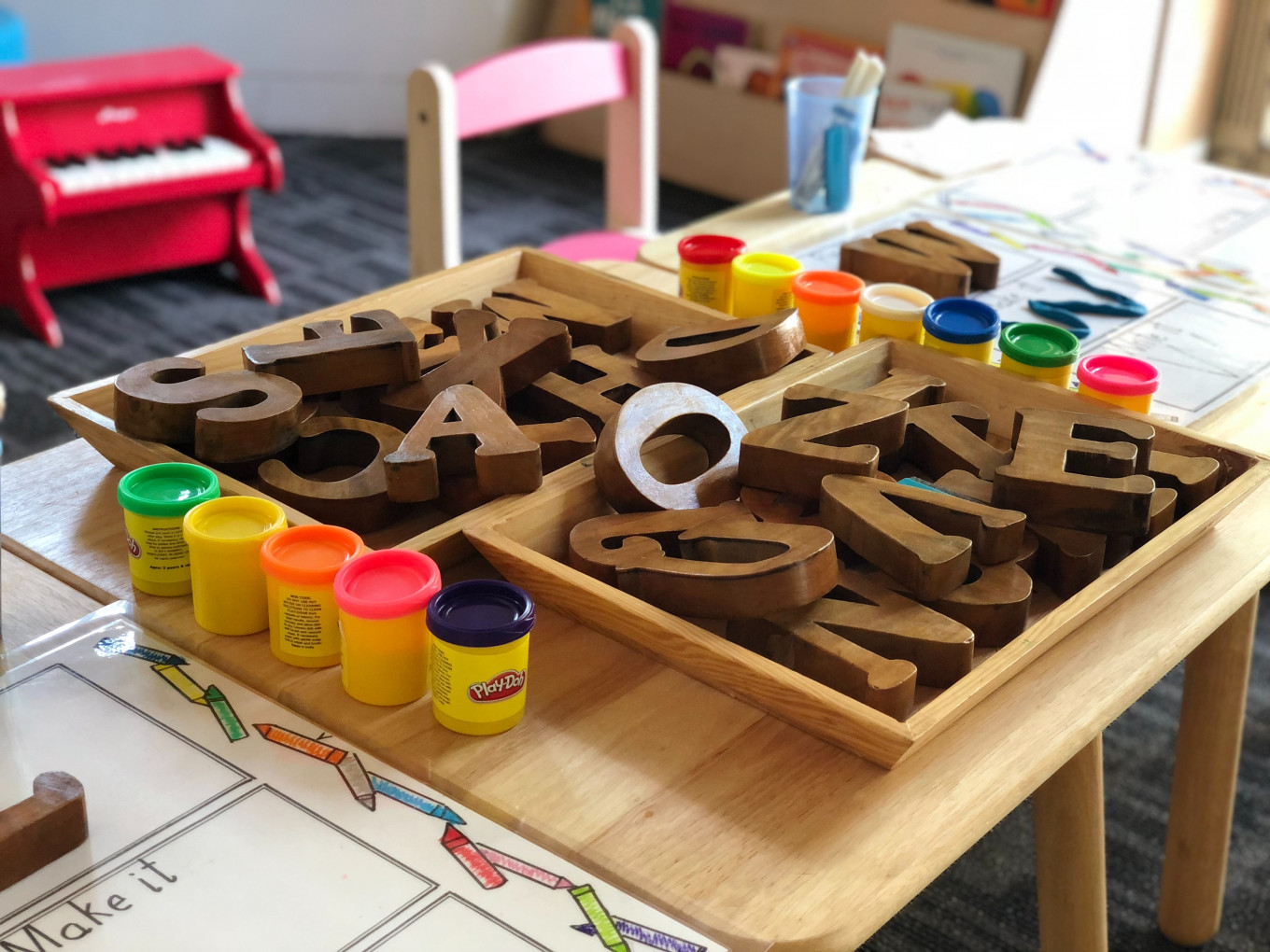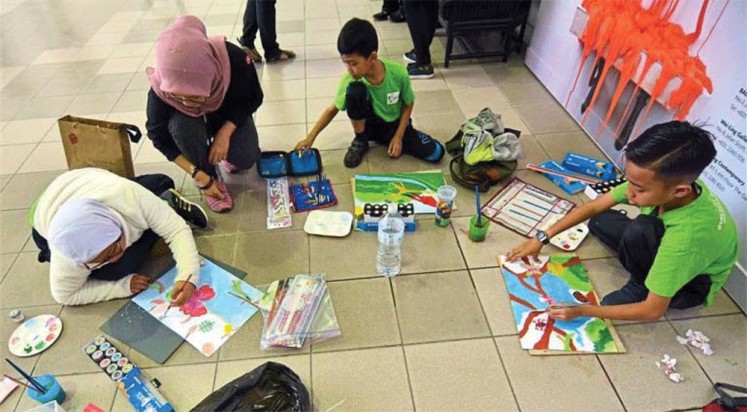Popular Reads
Top Results
Can't find what you're looking for?
View all search resultsPopular Reads
Top Results
Can't find what you're looking for?
View all search resultsNavigating dyslexia in Indonesia
Children and adults with dyslexia use a variety of methods to manage their condition and maximize their potential.
Change text size
Gift Premium Articles
to Anyone
Children and adults with dyslexia use a variety of methods to manage their condition and maximize their potential.
When Lely Yuniar Evelyn, 38, discovered she and her husband, Barlian Arif Ramadani, 44, had dyslexia while preparing to screen their children for the condition, the revelation made perfect sense to her.
Dyslexia, a highly heritable neurodevelopmental condition, makes it difficult for a person to read, write or spell, which explains why Lely used to "feel like she was falling behind in school and college". She would also be highly nervous when facing certain subjects.
"I had nightmares the day before a chemistry test," she admitted.
She also said she had always been more forgetful than her peers.
"I have always been forgetful. I often forget the schedule. I often lose my personal items," Lely said. "I tend to look absentminded because I often forget."
It is common for Lely to arrive at the wrong date, time or building for an invitation. She frequently takes wrong turns on the road because she does not remember streets or locations well.
As an adult, she needs to read a piece of writing two or three times to fully comprehend its contents because she will not register most of the information on the first pass.
"I can read quickly, but there will be information that will be missed and not recorded in my brain. So I will read it again and again," Lely said.
Study: Harwintha, who has been studying dyslexia for over a decade, says dyslexic children must not be labeled as flawed. (JP/Harwintha Yuhria Anjarningsih) (JP/Harwintha Yuhria Anjarningsih)Harwintha Yuhria Anjarningsih, a lecturer at the University of Indonesia's Faculty of Humanities who has been studying dyslexia for over a decade, said there were two types of dyslexia: acquired and developmental.
Acquired dyslexia usually occurred in adulthood as a result of a traumatic brain injury, whereas developmental dyslexia manifested at an early age and had a component of heritability.
Children with dyslexia
After Lely and her husband were tested, her children, Barra, 11, now in grade five and Lakeisha, 9, in grade four, were also tested for the condition. They are both students at SDIT Insan Permata Malang, an inclusive education school.
Both children were diagnosed with dyslexia. Barra now attends an inclusion program and has been accompanied by a shadow teacher in class since he started offline school in grade four.
Lakeisha participates in a standard grade-level program as her dyslexia is mild, and she can complete her schoolwork without the help of a shadow teacher. Lely said dyslexic children spent most of their early school years dealing with failure and struggle.
"So [Barra] had a speech delay, then starting in kindergarten, he frequently went on strike. He had trouble remembering the letters of the alphabet and had no interest in writing or learning to read," Lely said.
When he started first grade, the family was devastated by his poor academic performance. They screened for dyslexia by the end of grade one.
The pandemic forced Barra to attend school from home in second grade. It was a relief to Lely that she could assist him with his classwork every day.
Coping with dyslexia
Lely and her husband's challenges with dyslexia do not diminish their perseverance.
"Alḥamdulillah [thank God] when we were kids, we were taught various life skills. It seems that really helped our development."
Lely and Barlian are trying to help their children manage their dyslexia as well. However, it has not been an easy task.
Learning process: According to Harwintha, families must assist children in developing their language skills by encouraging them to talk and providing examples of well-spoken sentences. (The Star/P. Nathan)To help his son overcome adversity, Lely becomes Barra's educator at home. She accompanies him for extra studying, which involves reading with various props and doing language worksheets.
The family, who live in Malang, East Java, have created systems to help organize their daily lives. For instance, Lely creates a schedule of daily tasks, such as washing clothing and taking baths.
"[Our] hope is that these habits can also be used for independent therapy at home and independence practice," Lely said.
"Since dyslexic children are forgetful and have trouble understanding long instructions, they require extra stimulation in a unique way."
Parents with dyslexic children, Lely said, should not be discouraged. They needed to provide the best care as soon as possible as they were racing against time.
“Don't hesitate to consult a doctor or psychologist who understands dyslexia. Immediately get assistance to improve the children's quality of life," said Lely.
Harwintha shares Lely’s belief that a supportive environment can help children manage dyslexia.
Since dyslexia is linked to language, it is critical to monitor the development of spoken language. According to Harwintha, families must assist children in developing their language skills by encouraging them to talk and providing examples of well-spoken sentences.
Thinking differently
Despite the fact that dyslexia affects 10 to 20 percent of the population, many people are still unaware of it. At regular schools, dyslexic students are often wrongly labeled as less intelligent, lazy or unable to keep quiet.
Lely knows that she's actually intelligent. She said, "We only think differently. My son has an above-average IQ."
But since they have dyslexia, their brains functions differently than other people’s. Lely said they must exert two to three times the effort in many daily activities.
Still, Lely is convinced that this is not a problem because they focus on their strengths. After all, she feels it is "God's will and a gift from God", and they are pleased with it.
Acceptance, according to Lely, is the key.
"If we deny, if we grieve, it won't make us better. In fact, it would be a pity if later the children wouldn't be able to get proper treatment if we were to drown ourselves in denial. So we focus on accepting our weaknesses and maximizing our strengths," she said.
Harwintha also agreed that dyslexic children were unique and should not be labeled as "a child with flaws”. She believed that people should give them the space they need to grow.
Supportive communities
Lely said that she "feels less alone" after joining the East Java Dyslexia Parents Support Group (DPSG) in East Java. Her family psychologist is the group's leader.
The community established a WhatsApp group for Malang residents and an Instagram account, @dpsg.jatim.
"When one of us is feeling down, we each help lift the other up," Lely said. "We support one other and share our experiences and insights when dealing with the challenges of dyslexia, whether our personal experience or our children's, until we figure out how to solve the problem."













